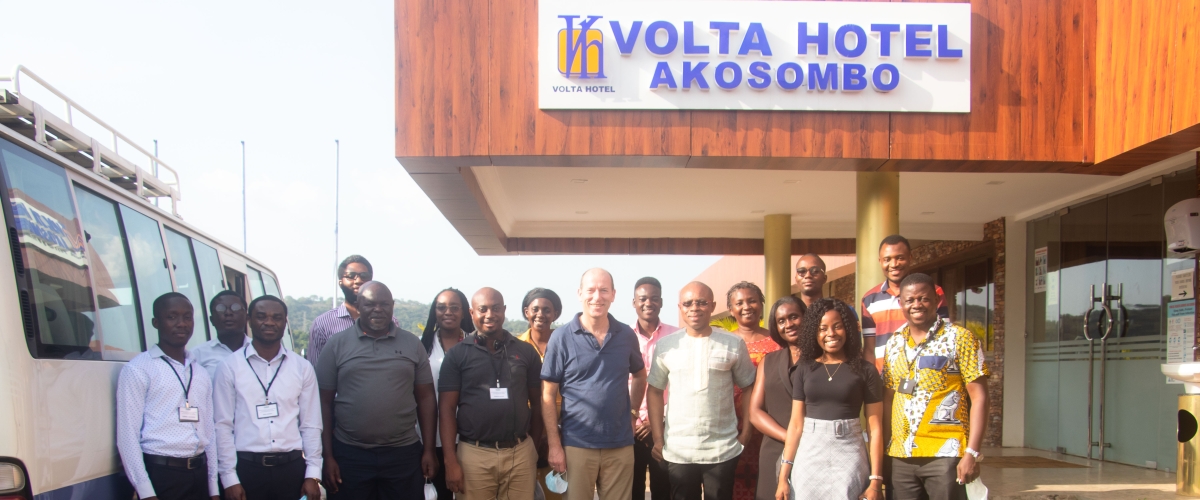
“The agricultural and food security challenges of Africa can only be addressed by African data which is generated locally”, reechoed, outgoing FARA’s Director of Research and Innovation Dr Irene Annor- Frempong’ at the Workshop on Semantic and Relational Data-Based Management Systems for systems operated at FARA, held at Akosombo Hotel in Accra, Ghana, from 26th - 30th November 2020.
The Forum for Agriculture Research in Africa (FARA) hosted a workshop whose aim was to facilitate the establishment and interoperability of the Comprehensive Africa Agriculture Development Programme’s ex-Pillar 4 (CAADP-XP4) knowledge management systems among the five implementing organisations. The CAADP-XP4 Programme is funded by the European Union (EU) and administered by the International Fund for Agricultural Development (IFAD). It is implemented in collaboration with the African Forum for Agricultural Advisory Services (AFAAS), Association for Strengthening Agricultural Research in East and Central Africa (ASARECA), West and Central African Council for Agricultural Research and Development (CORAF) and Forum for Agricultural Research in Africa (FARA).
CCARDESA was among the (CAADP-XP4) institutions which participated in the workshop. Key among the objectives was to understand the key indicators, data structures, data types and formats, semantics, and the relational models of the AU CAADP-Biennial Review Systems. The meeting also sought to draw basis for synchronization and interoperability of systems in CAADP-XP4 programmes to leverage on each other’s strength to optimize data usage for critical decision making. The rationale behind the interoperability stems from the desire by the European Union to support the CAADP-XP4 organizations to strengthen and maintain interoperable knowledge management systems that will allow the effective exchange of climate-relevant agricultural information, knowledge, and data management.
Like a borderless regional zone in a free trade area, information systems that are interlinked allow users to navigate through all the five XP4 organisations at a click of a button without having to visit individual websites or knowledge hubs. In essence, this means that the users will have access to the partner organisations information when they visit the CCARDESA website and vice versa. The interoperability intimated does not make the organizations lose their autonomy but instead, each organization rides on the strengths of another by having a larger audience accessing its resources and data respectively.
The workshop was officially opened by Dr Aggrey Agumya the Director of Research and Innovation at FARA who expressed contentment that the Knowledge management unit was making great strides in achieving and implementing its newly approved strategy. He also indicated how delighted he was to note FARA’s knowledge management aspect tilting more towards information sharing as opposed to advocacy as in past years. Dr Agumya also urged the Sub-regional Organisation (SROs) to continue working to strengthen the existing synergies for the optimum impact of knowledge sharing in Africa. Speaking at the same function, Dr Irene Annor- Frempong’ urged workshop participants to contextualize the data to the African context. She mentioned that gone are the days when Africa borrowed data from other countries and applied it to its programmes. She emphasised on the need for Africa based data to address Africa’s agricultural challenges.
At the same workshop, the Executive Director Dr Ayemi Akinbamijo officially launched the FARA M&E automated organizational system which will allow all M&E Officers in the consortium to input and track statistical data thereby making it available at a click of a button. Dr Akinbamijo expressed joy to see the automated monitoring and evaluation system transform into a reality after he suggested the initial idea six years ago. He also thanked the FARA team particularly the intern and junior consultant who made his dream come true. Prior to the launch of the automated M&E system, the CAADP e-Biennial systems were presented including challenges faced which led to the development of the launched system.
The workshop tabled several topics including e-Commerce, e-CAPS portal developments, Climate Smart Agriculture stakeholder mapping including the SROs knowledge management tools and systems used to reach their diverse audiences. Several data systems within FARA were presented and feedback was provided to help improve their functionality.
The meeting ended with concrete next steps of developing the knowledge graphs that will show interoperability of institutions while retaining their autonomy, develop data capture strategies at both regional and continental levels, also for FARA to retain only functional data platforms. The workshop participants included knowledge management experts, Monitoring and Evaluation experts, Information technology experts, App and website developers, e-commerce experts drawn from both regional and global level.
The CAADP-XP4 Programme intends to boost the agricultural transformation agenda through innovations in agriculture and food systems in partner countries which will make them resilient to climate change and to better respond to the development demands. The CAADXP4 Programme has a very strong knowledge management component within which it is conducting knowledge management and data capture guidelines at the national, regional and continental level. It also plans to create linkages within the institutions' knowledge management systems so that they do not operate in silos but leverage on one another’s strength thereby giving the SROs comparative advantage over other systems.
CCARDESA is implementing the four-year CAADP-XP4 Programme in 7 countries (Eswatini, Botswana, Mozambique, Namibia, Tanzania, Zambia and Zimbabwe).






